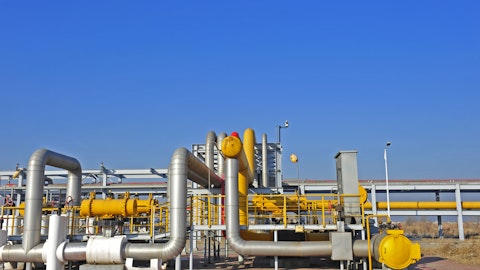David Anderson: Very much understood, Paolo. One final question as it relates to the buyback that you announced today. Is this targeting just the open float of shares or will the closely held shares be participating in the buyback as well?
Paolo Rocca: We don’t know. I mean, we launched the program having in mind the return that we can get from our cash by investing in the company compared to the investment we can get by managing the liquidity. This is a key factor for the decision. As I mentioned, we will have an intermediate bank to perform the acquisition in the coming quarters, starting next week probably and we will see. I don’t think we can add more on this.
David Anderson: Okay. Thank you very much, Paolo. Appreciate it.
Operator: Thank you. And we have time for one more question. One moment, please. And it comes from the line of Jamie Franklin with Jefferies.
Jamie Franklin: Hi there. Thank you for taking my question. I was just wondering if you’d give us any color on CapEx plans for 2024 and ’25. Obviously, there’s been the announcement of this second investment in a wind farm in Argentina, which is great to see. Beyond that, should we be expecting further bolt-on M&A and where specifically would you be looking? And what about the possibility of adding seamless capacity internationally? Is that an option? Thank you.
Paolo Rocca: Thank you, Jamie. Our — we will be spending in CapEx in the range of $350 million in the first semester of 2024. And we plan to spend a similar amount in the second half. So we’re running at a pace of around $700 million in CapEx. We have among our investment, investment, as you mentioned, in the wind farm in Argentina. The wind farm in Argentina, we completed the first one in line with our budget more or less with very small difference. We consider that this is an area in which — it’s the first priority for decarbonizing Tenaris because we can do it in very effective condition and very competitive condition. We could continue with the development of the second wind farm. Then we have intervention in improving in Argentina, in improving our operation in the steel shop, reducing also our energy consumption that goes in the same direction and add, let’s say, improve operational condition for our — we also have investment in our operation in Dalmine and in the US in our steel shop in copper.
So these are basically the issue that are, let’s say, receiving investment of, let’s say, relevant size. Then we will have to, let’s say, to consolidate the acquisition of Shawcor and see once we receive the antitrust clearance, if this goes on, maybe that — this will require, let’s say, additional investment or consideration for this that we cannot predict now. I think these are the main areas. We do not see, after the acquisition of Republic, specific target or areas for our M&A, but we, as always, are analyzing and considering our strategic positioning in every region of the world. Tenaris is a global player, is a leader worldwide, and has to maintain, let’s say, an exercise of strategic focus in all of the regions in which we operate to understand how we can strengthen structurally our position.
But for the time being, we have nothing so relevant to consider.
Jamie Franklin: All right, thank you.
Operator: Thank you. And ladies and gentlemen, this concludes the question-and-answer period. I would like to turn the call back to Giovanni Sardagna for his closing comments.
Giovanni Sardagna: Thank you, Carmen. And, well, thank you all for joining us on our quarterly call, and we’ll see you soon. Thanks.
Operator: Thank you, ladies and gentlemen, for your participation, and you may now disconnect.
Follow Tenaris S A (NYSE:TS)
Follow Tenaris S A (NYSE:TS)
Receive real-time insider trading and news alerts


